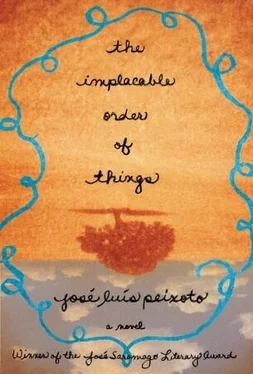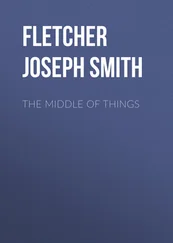In ten minutes I was all dressed. I went and got my mother, who was sitting down, dressed in a crimson velvet dress and lace stockings up to her knees, looking like an orphan girl or a forlorn doll. We shut the front door and headed toward the church. The sun was the sun inside an oven. Holding her by the hand, I led my mother through the strip of shade next to the wall. Salomão, in the middle of the street, tried to keep up with his awkward way of walking, as if he were going up and down stairs. My mother, indifferent to the sun and to the morning and to the streets she seemed to see, repeated the words she always repeated. Whispering at great speed, she said more than five words with each step she took. And the older women marveled when they saw her, saying look, here comes the widowed cook, and they’d come up in pairs to talk to her, but my mother wouldn’t look at them, she’d look down and keep on with her story, on and on, words; and the women, in unison or one at a time, would say poor thing, and let us keep going. When we arrived at the church, the only ones there were Master Rafael and the blind prostitute. She was grabbing onto his arm, and both were sweating. He wore a black winter suit and a heavy flannel shirt. She wore a simple dress and a white apron with a pocket in the middle and colorful embroidery along the bottom.
ON THE SAME NIGHT that Master Rafael spoke to her of marriage, the blind prostitute remembered the apron her mother had embroidered for her. Several days later, she took it from the chest where it nestled among blankets. She felt and smelled it. She slowly passed the apron across her face. And, all alone, she smiled as she had smiled more than twenty years ago, as a child, when her mother had given it to her, saying one day you’re going to get married and you’ll need this. And her mother didn’t smile as she gave it to her, as her grandmother hadn’t smiled, as her great-grandmother hadn’t smiled, for they all knew that no man would want to marry a woman like that. And after they all finished making aprons for their daughters, they all destroyed the apron their own mother had made them, not because of an established tradition but because they’d run out of hope. And the blind prostitute could still remember the sound of the scissors cutting, the silent sound of the needle and thread passing through the fabric. And no one who saw the apron could ever imagine it had been embroidered by a blind woman, so accurate was its shape, so precise its embroidered letters: letters that had been copied from a towel given by Doctor Mateus’s grandfather to the blind prostitute’s great-grandmother, letters that were chosen because of the long loops in the d and h and the lonely dot over the i and that spelled dishes. When Salomão and his wife and the widowed cook arrived at the church, the blind prostitute and Master Rafael were waiting with their arms entwined, she discreetly running her hand over the apron, making sure it had no wrinkles. Salomão wobbled faster in his badly pinching shoes. Master Rafael’s face looked younger. They exchanged a few words, as if exchanging a shared relief, and introduced their spouses. The blind prostitute and Salomão’s wife silently and simultaneously pursed their lips, wordless and blind. The two men kept talking in the hot sun until the devil’s smile filled up the area in front of the church. He stopped at the church door and smilingly searched his pockets for the key. Finding it, he inserted it in the lock and turned it with great force to overcome the rust. The hinges groaned a sigh, and his shoes crushed dry bits of dirt as they walked over the church floor. He was followed by the blind prostitute on Master Rafael’s arm, by Salomão, and by the widowed cook holding on to her daughter’s hand. The sound of the crutch and of footsteps approached the altar. In silence they watched the devil get dressed. The widowed cook and her daughter were the female witnesses and stood, respectively, behind Master Rafael and the blind prostitute. Salomão stood in the middle, as he was the male witness for both the bride and the groom. Having removed his cap and donned his chasuble, the devil blew the dust off the black book, smiled, and approached. And in the middle of his smile, words sounded. At first the wedding couple and the attendants tried to understand them but soon gave up, since they had never heard and couldn’t understand them. And the devil’s words drowned out the words that the widowed cook avidly repeated, repeated, whispering them in the echo. Cobwebs hung from the walls, weighed down by the dust and trembling when the devil raised his voice. The statues of saints, with their faces scarred by deep cracks, looked troubled. In one corner there was a glass case, coated with dried wax drippings and filth from the flies, that contained a huge hand truncated at the wrist and secured by wires. Its motionless fingers seemed to be grasping at something. Many years ago, when a certain coffin had been unearthed and its bones were being attended to, the hand was found to be still intact. The devil ordered the glass case to be made for it, and the word spread that a saint had been discovered. The earth had caved in on the coffin, and among the bones wrapped up in a bedsheet was the still-preserved hand. It was the hand of the giant. The devil washed it, used face powder to hide some teeth marks of dogs, used scissors to cut some long veins coming out of the wrist, and hung it from wires inside the case. He lit candles and left the church door open for a week. Since no visitors came, he blew out the candles, closed the church back up, and forgot about it. And there it remained, indifferent to the world and to the wedding, lit by the blue shadow of a small stained-glass window. When it came time to exchange rings, Master Rafael’s left hand was of no use, for they had no rings. And the devil stepped toward their yeses, which no one heard, and told them to sign. They all signed with an X , and Salomão, who was the male witness for them both, signed one side of the page with two crossing diagonal lines, and the other side with a vertical line crossing a horizontal one. Salomão and Master Rafael left the church laughing. No one was waiting for them outside. Master Rafael misjudged with his crutch and fell down the steps. Salomão helped him up and shook the empty knee and elbow of his suit. Are you sure you’re all right? he asked timidly, taking two steps backward, toward his wife. With almost no goodbyes, the newlyweds went hand in hand down the street that would take them home, Master Rafael swinging on his crutch, as the blind prostitute’s head turned aimlessly on her neck. In silence Salomão, his wife, and his wife’s mother also went home. The widowed cook, holding her daughter’s hand, walked in the shade. Salomão went barefoot, carrying his shoes in his hand.
WHEN I REACHED THE MOUNT OF OLIVES, old Gabriel was surprised to see me. I told you yesterday that you could take the day off. Indeed he had. I’d taken a glass of water for him out to the yard, where my mother was spinning the endless wheel of her stories, which he pretended to listen to, and he said don’t come tomorrow, you can miss a day. But I went. I knew that I had to go. I undressed my mother, removing and putting away the outfit she’d worn at the wedding; I dressed her, I put away Salomão’s clothes, I got undressed, I dressed, I gave my mother her soup, put my scarf on my head, and went. I told you yesterday that you could take the day off. I didn’t answer. And without paying attention to the questions he asked about Master Rafael’s wedding, I looked at José’s house. It was shut. The windows all shut. Old Gabriel noticed me looking and also stopped to look. Before he could say anything, I went into the rich people’s house, and the coolness of the rooms and halls protected by old and thick walls couldn’t put out the fire of that sun burning my body. I went to the kitchen sink made of marble and threw handfuls of water on my chest. With my eyes closed I threw handfuls of water on my chest. And I remembered being little. I remembered being little, six years old, and leaning into my mother, pretending that she was hugging me. I remembered hearing people say she practically raised herself, all alone. Alone. Alone. This, mixed up with José’s face, was a crumpled pain inside me. Inside that huge and somber house, me a little girl with my huge and somber self. Me six years old, and the women left me bowls of soup on the doorstep, where my wild eyes would look out and retreat. She raised herself, they said. I found out later from old Gabriel, who told me without my asking, that for three years I didn’t eat, that for three years I survived exclusively on the fat I had in my body. I found this out one afternoon, without having asked, when he came to see my mother and happened to mention it, as if it were normal. I didn’t ask him, but he told me more, he said that when my ribs and cheekbones began to show, he started to bring me bunches of green vegetables and onions and potatoes and strings of garlic and jars of olive oil. And I, not yet four years old, would peel vegetables and cook and eat and wash dishes. I didn’t ask him and would have rather not known, for I’ve never forgotten what it was like to have no one. Solitude. The big and empty house, dark at night. My mother next to me and alone, repeating her words over and over, like a breeze that never, never stopped murmuring, like a moan, like words that weren’t words but something else that had the form of words and that was endlessly repeated, like a sorrow. Yes, like a sorrow. My old mother. Almost dead. My mother far away from me. The dogs barking, the birds and voices in the distance, beyond the walls. My room pitch black and, beyond it, almost indistinguishable from a breeze, the soft sounds of the man shut up in a windowless room writing: his fountain pen circling on the paper, suddenly pricking it or crossing something out; his gentle breaths against the ink; sheets slowly placed over other sheets, sheets crumpled up and hitting the ground with the sound of eggshells. The shadows. The morning sun in the yard. And this, which was so little, was all I had until the day I met José. His gaze. And there, in the rich people’s house, I once more filled my hands with water and threw it against my chest. And as I tried to feel some coolness, I heard the voice shut up inside a trunk, far away, alone. I slowly, silently approached. Sitting down in the main hallway, I still heard it say: solitude, death.
Читать дальше












